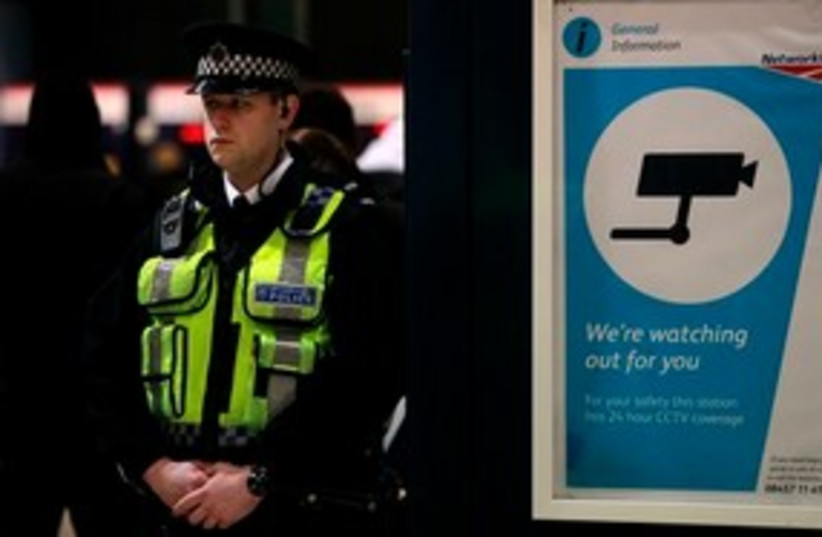Israeli student Neriya Ashwal landed at an airport near Nottingham last Friday and was detained for questioning by the anti-terrorism unit, according to Walla.
Neriya is an Israeli student studying in Barcelona. Last weekend, he had an unpleasant experience when he went on a short visit to Britain for a few days, landing at the small East Midlands airport outside Nottingham on Friday.
During questioning at the border control, he was asked if he had recently visited Israel, and he answered yes. He was then forced to undergo a more in-depth questioning by no less than the anti-terrorism unit.
After the border control officer asked the usual series of questions, Neriya was asked if he had recently visited Israel.
"I answered yes and said I had visited family and friends three weeks ago. The border control officer called someone on the phone and reported that they had an Israeli who had visited Israel recently," Neriya told Walla in a phone call from Barcelona. "He nodded, hung up, and asked me to sit and wait on the side. The passport remained with him."

He continued, "After about a quarter of an hour, three uniformed police officers arrived, talked to each other, looked in my direction, and after another five minutes, two more people in civilian clothes arrived and escorted me to an interrogation room.
"The most senior of them told me, 'We are from the anti-terrorism unit. You have nothing to worry about. You are not detained. We just want to have a short conversation. You may go if you choose, but if you choose to go, we will detain you.'
"They started by asking the usual questions again: Who am I? Where did I come from? Why did I come? Where do I plan to stay? What exactly do I plan to do? But then it took a left turn.
"They started asking, 'Were you in the army?' Were you a combat soldier? 'I told them that I had diabetes and that I was not a fighter but in intelligence.
"They continued: 'Were you in the field?' I answered no, while it seemed to me that I already understood what they were looking to hear and what they weren't. They continued with questions about the visit, 'When you were in Israel, did you have any role in the army?' I answered 'no' to that as well."
Neriya says that at the end of the questioning, they asked for proof of all his plans for the weekend, a return flight ticket, booking a place to stay, and a bus ticket to London.
"They tried to be nice, and when the most senior of them left the room, the junior said to me: 'We don't have a problem with you, but because you come from this region, we just want to make sure. There are simply others who come here with other intentions, you know.'
"The senior officer then returned to the room and said that I was allowed to go but that they wanted to check my bag first. Another policeman arrived and completely turned my bag over from end to end. He found nothing. Of course. In good time, after an hour, I was free again."
A new policy?
Following the incident, Neriya addressed a letter to Israel's current ambassador to the UK Tzipi Hotovely and mentioned the similar case of Nova survivors, the Sharabi brothers, who were detained at Manchester airport about a month ago.
He also mentioned that he is bringing his case from last week to the attention of the Foreign Ministry because, according to him, "If there is an instruction/policy/or even a local initiative by the border control officers to detain and interrogate any Israeli who is leaving military service or an Israeli who recently visited Israel. This is a disturbing phenomenon that Israeli officials need to recognize and deal with through the official channels."
He also sent a copy of the letter to Foreign Minister Israel Katz.
"I wasn't afraid, but yes, I was surprised," the 28-year-old shared. Neriya has a bachelor's degree in politics, government, and the Middle East from Ben-Gurion University of the Negev.
He has also worked as a consultant in former prime minister Naftali Bennett's office and has lived in Barcelona for the past seven months, where he is studying for an MBA.
"I did not expect that the fact that I am an Israeli who visited Israel a few weeks ago would be a red flag that requires questioning."
He added, "I warn others that this is an unpleasant experience, especially because, in my estimation, if I had been a combat soldier who served in Gaza, I suppose the questions would have taken a completely different direction. I hope that if there are other Israelis who have experienced something similar, they will also share and for those who leave the army and served in Gaza, then they will know that there is now this risk that if they arrive at an airport in the UK, they may be arrested and interrogated.
"In Israel, we know of similar cases in which Israelis were detained upon their arrival in Britain, even beyond the incident of the Sharabi brothers, and keep an eye on the phenomenon, which so far has not gone beyond careful questioning."
The long-standing policy in Britain does not respond to specific cases. Still, a spokesman for the British Home Office told Walla in reference to the case that "our border control officers always work professionally and do not discriminate against any passenger on the basis of their country of origin or their race."
He added, "Our priority is to enable a safe and secure border, and the border control officers will carry out the checks deemed necessary to achieve this."
